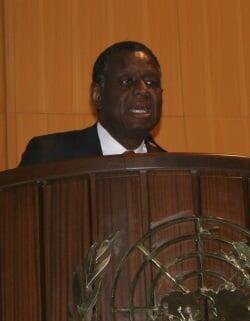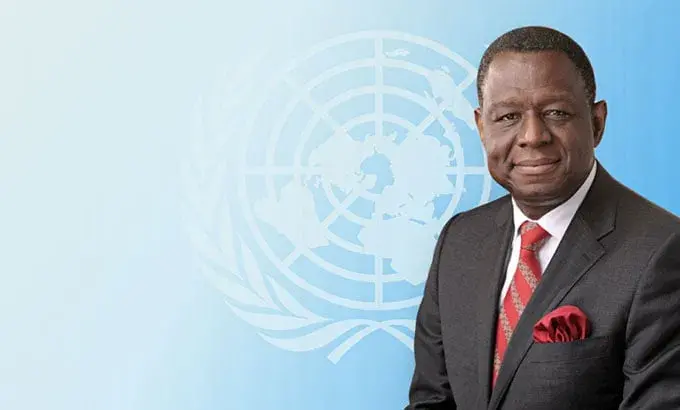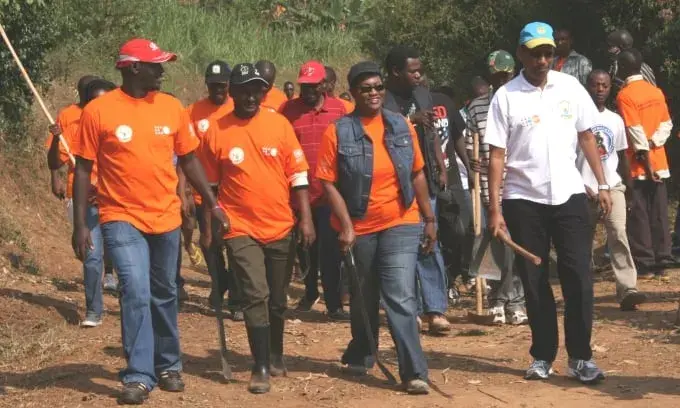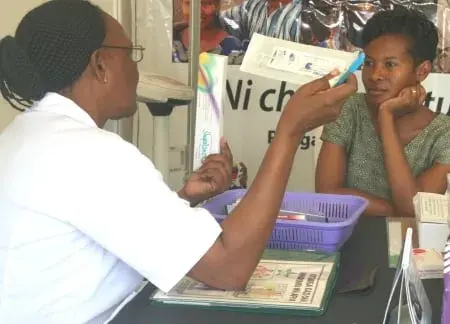ADDIS ABABA, Ethiopia — UNFPA would strive to ensure that the post-2015 agenda explicitly includes targets on sexual and reproductive health and reproductive rights, to address violence against women and to promote women’s rights and equality, said Dr. Babatunde Osotimehin, UNFPA Executive Director.
Dr. Osotimehin was speaking on the review of progress towards the ICPD Programme of Action and the Agenda Beyond 2014, at the African Regional Conference on Population and Development in Addis Ababa, Ethiopia.
He said if the 540 million girls in developing countries were empowered to make choices about their own lives – to stay in school, to delay marriage and childbirth and to seek decent employment – they could fulfill their own potential, contribute enormously to their communities and drive their countries’ development. “That is the future we should all want for Africa and for the world,” he said.
Population dynamics in Africa had a profound impact on the continent’s economy. Africa was in a remarkable demographic transition in which human rights-based and gender equality-based population policies could stimulate sustained and equitable economic growth and foster inclusive social development.
Assessing impact of MDGs and ICPD
Two years ago, the UN system and development constituencies began a comprehensive review to assess the impact of the MDG framework and progress on implementation of the ICPD Programme of Action.
“This offers an unprecedented opportunity for development partners and planners to reposition population issues in the broader post-2015 and post-Rio +20 debate and further shape human rights-based, inclusive, equitable sustainable development,” he said.
While the MDG framework had galvanized the world’s attention and efforts, and while significant progress had been made on a number of fronts, significant challenges remained when it came to achieving ‘the future we want for all’. The reviews had highlighted the critical importance of overarching guiding principles, such as human rights, equality and sustainability, which were missing from the MDG framework.
Also missing from the framework were necessary policy areas such as inclusive economic growth and greater and sustained investment in the social sector, such as education and health, including reproductive health.
“There is strong evidence to suggest that investment in the population and social sector and in bridging growing social and economic disparities within and across countries is both a process and a development dividend. It’s also a guarantee of sustainability,” he said.
Curb inequality and support disadvantaged groups
Within these two complementary policy and programme areas, two intermediary overarching goals become critical for the post-2015 agenda: Curbing the sources of inequality and bridging disparities, and supporting groups at a disadvantage, mostly women; young people and the elderly; adolescent girls; and marginalized, vulnerable groups.
It is in this context that the ICPD Programme of Action’s provisions and population and reproductive health issues become central to development. That is why they must be an integral part of the post-2015 development agenda. They should be considered from a two-pronged policy perspective: addressing the consequences of evolving population dynamics, and bridging disparities and ensuring access to reproductive health and protection of reproductive rights.
“Both prongs are crucial to achieving truly sustainable social and economic development and human dignity and wellbeing for all,” he said.
The ICPD Beyond 2014 Operational Review had identified priorities and commitments that were intimately linked to a post-2015 development agenda. Ending poverty and discrimination was a necessary condition for sustainable development.
“In spite of this, many women and girls experience the most pervasive inequality and human rights abuses, including gender-based violence, which affect a larger proportion of the world’s population than any other form of discrimination or abuse, and occur in all societies,” he said.
Sexual and reproductive health and reproductive rights essential
The ICPD and MDG reviews, along with the ongoing discussions on the post-2015 agenda, acknowledged that sexual and reproductive health and reproductive rights, especially of women and young people, particularly adolescent girls, are human rights and are essential to the enjoyment of other human rights.
“Ensuring the right to make basic choices in respect of one’s sexuality and reproduction is a pre-requisite to the fulfilment of human potential, particularly for women and adolescents who are socially or economically disadvantaged,” Dr. Osotimehin said.
Yet in spite of recognition of the contribution of SRHR to human rights and development, progress on the continent has been uneven, with some countries having made remarkable gains in achieving health-related targets - yet many had fallen behind.
Highly effective policiies needed to address challenges
“Inequity and very poor access to sexual and reproductive health information, education and services, particularly for women and adolescent girls, have resulted in slow progress in achieving MDG5, targets A and B, in almost all countries in Africa. In addition, early and forced marriage and all forms of violence and discrimination against women and girls continue to contribute to poor reproductive health outcomes,” he said.
Addressing these challenges now and beyond 2015 required a set of proven, highly effective policies to:
- Strengthen and finance health systems for the provision of essential sexual and reproductive health services, including maternal health services, family planning and HIV & AIDS prevention;
- Enhance or introduce legislation and programmes to facilitate access to SRH services and information and protect the reproductive rights of all;
- Make comprehensive education on human sexuality, human rights, gender equality and non-violence available to all adolescents and youth;
- Build capacities to collect, analyze and apply the demographic and health data required for the design, implementation, monitoring and accountability of these policies and programmes.





